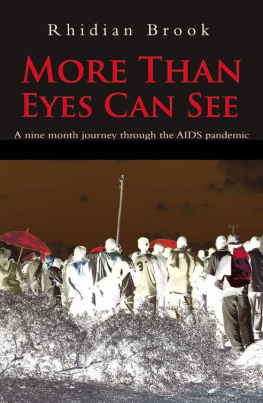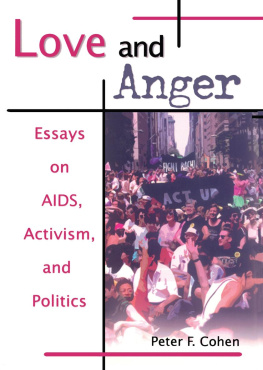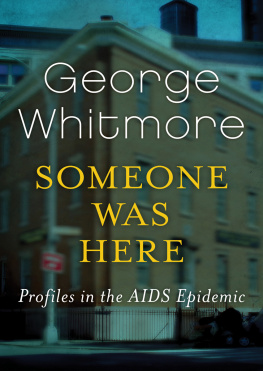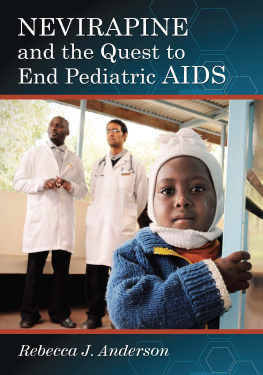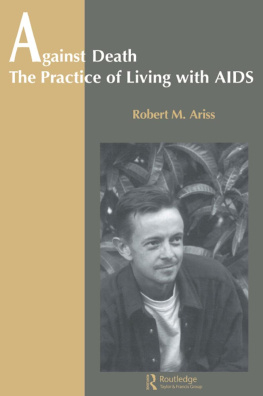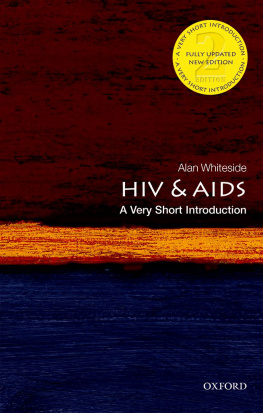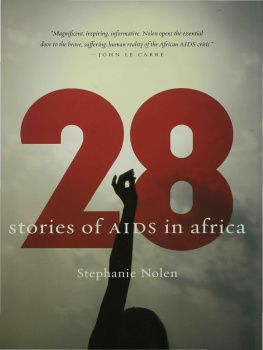For Gabriel and Agnes, who made it possible to see much more.
Only connect E. M. Forster
This book has unusual provenance. It was someone elses idea and only one part of a much bigger idea at that. It came my way via a long, serendipitous chain of human connections set in motion by a woman who lived ten thousand miles away
In the Autumn 2003, Nikki Capp, a Melbourne mother of two, member of the Salvation Army and part-time employee of drug company GlaxoSmithKline was troubled by a big subject and a needling question: HIV/AIDS and what are you going to do about it? As a corporate affairs manager for GSK (who made the antiretroviral drugs (ARVs) taken by HIV/AIDS patients) and through her own awareness of the Salvation Armys HIV/AIDS work, she was often stepping into the penumbra of the pandemics shadow. She was part of two monolithic almost antithetical organisations, linked by the common ground of HIV/AIDS.
One night, she had what she called a waking dream in which she saw five people sitting around a table: herself; the General of the Salvation Army; JP Garnier (the then global head of GSK); her husband Nick (who worked for a micro-financing organisation); and Rupert Murdoch, the head of News Corporation. The people around the table were having a conversation about HIV/AIDS.
By her own reckoning Nikki was a nobody in both GSK and the Salvation Army but she interpreted this dream as a commission to get to the tops of these organisations, orchestrate a meeting between them and pitch the idea of them working together to address the global HIV/AIDS issue. For the next two years, she set out to persuade these VIPs to take seats at the table of her dreams. She already had one vital connection to an Australian doctor called Ian Campbell, the head of the Salvation Armys International Health Services and something of a seminal figure in HIV/AIDS response work; and there were openings, through her own and her husbands work, to GSK and the world of micro-finance . But the journey was not a straightforward stroll through a line of open doors; there was much scepticism, some scoffing and a number of nearly-but-not-quite encounters that required doggedness, a truck load of faith, and constantly telling myself that I wasnt crazy. After two years it was just about possible to imagine reserving at least three of the seats at the envisioned table. The elephant not in the room was Murdoch.
Nikkis mentor at that time was the retired former head of the Salvation Army, General Eva Burrows a legend in Salvation Army circles and a woman who, in her role as world leader of the Army, had made powerful friends. One such friend was Dame Elisabeth Murdoch, the mother of Rupert Murdoch.
Despite her age (ninety), Dame Elisabeth was sharp on events and a great champion of the Salvos (as the Salvation Army were known in Australia); she was happy to meet Nikki to talk about such an important issue. Nikki travelled to Dame Elisabeths house outside Melbourne and after a drive around the grounds in the dames buggy, she began to explain what she thought she was trying to bring about. She felt, as she often did telling people about her dream, like a total idiot, but Dame Elisabeth saw meaning in the peculiarity. She took Nikkis materials detailing the nature of the Salvation Armys worldwide HIV/AIDS response and a letter requesting a meeting with her son. She wrote Ruperts home address on an envelope and handed it to Eva so that she could write to him personally. When he sees my handwriting, hell open the letter.
Months passed and Nikki was again wondering if her idea was a dream too far when, in January 2004, she received a message through Eva Burrows that Murdoch was willing to meet her. That April, the media mogul gave the woman from Melbourne who had had a dream as much time as he usually allotted to world leaders. As she stepped over the threshold of the News Corp building, Nikki recalled the line shed read from the Book of Esther and that shed written in her diary months ago as an encouragement: who can say but you have been elevated to the palace for just such a time as this?
The king of News Corp was gracious and practical; he expressed genuine concern for the HIV/AIDS situation and he was struck by the nature of the Salvation Armys response to the pandemic. He indicated his willingness to bring News Corp to the table to discuss how the four proposed partners might do something together. He said he would nominate someone in his organisation to help Nikki explore ways of developing a partnership. A meeting was actioned for the Autumn in London.
In November 2004, Nikki and Dr Ian Campbell met with James McManus, the head of TSL education, Nigel Hawkins the Health Editor of The Times who had a particular expertise in HIV/AIDS and Simon Willis, a managing director at the TSL group.
Nikki and Ian had talked about what they wanted to say beforehand. In our heads it sounded good: statistics about HIV/AIDS and poverty didnt drive action; but stories and real life experience did. By helping people experience that, maybe in some way we might move them to act. We wanted them to help us help the man in the street realise that people living in poverty have the same aspirations, dreams, resilience and innate capacities to survive and to prosper, as does anyone living in a wealthy country and that understanding this was a key part of our response to HIV/AIDS.
But what sounded worthy and good in their heads sounded confused and imprecise when pitched. Salvationists use a lot of jargon and have a predilection for acronyms (they are an army after all). If the substance of the work was deep the describing of it was flat. As Ian Campbell began to talk about local facilitators and motivators, Community Counselling, Income Generating Activities (IGAs) and Psycho Social Support (PSS) activities, the eyes of the corporate-speak-savvy executives began to glaze over. After hearing them out, James McManus raised a finger: half Salvation Army salute (pointing to heaven); half Please stop!
This is great the work sounds wonderful and we want to help but I havent the foggiest idea what youre talking about.
Ian and Nikkis hearts sank. All this treasure but no easy way of sharing it.
Thats our problem, Nikki said. We need someone to help us put the deeds into words.
It was then that Simon Willis suggested the idea of writing a book. It wasnt the full realisation of the dream, but Nikki felt that perhaps it was a part of it. They began to discuss how, who, when and where. Immersion in different communities around the world in different continents, drawing up alongside the infected and the affected. Dr Campbell and Nikki knew some good people in the field who might be able to facilitate the collecting of stories.
James McManus put up an interventionist finger again.
There is no way you or anyone in your organisation can write this book. You have to find someone else to write it; to facilitate the collecting the stories, as you put it. Do you know anyone who might want to do that?
Just when you think youre in the middle of your own story playing the main role, speaking your familiar lines, going through your habitual motions you find yourself part of someone elses story; a story that has been going on for some time and in which you have a small role to play.
This is an account of a journey I made with my wife Nicola and our two children, Gabriel and Agnes, between January and September 2006, to the heart of places affected by the HIV/AIDS pandemic.
The task has fallen to me to write about what I saw and I cant entirely nor would I dare speak for my family. But because we were together 24 hours a day, seven days a weeks for nine months, there were moments when we became an eight-eyed , eight-legged creature, seeing and experiencing things as one. For this reason I occasionally switch from the singular I and me to the collective we and us.

